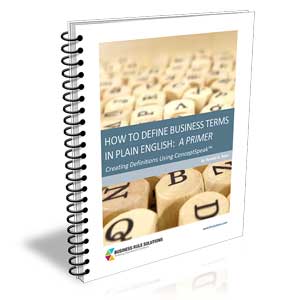SBVR Speaks on Rules: Authorizations
SBVR makes a 'light world' [1] assumption about rules. In a light world, anything that is not expressly prohibited is assumed permitted, and anything not expressly declared as impossible is assumed possible. Business rule practice indicates that this choice is the appropriate one for the large majority of business problems.
Occasionally, practitioners may discover 'dark areas in a light world' — areas in which the opposite assumption is appropriate. In such a dark area, anything not expressly permitted is assumed prohibited, or anything not expressly declared as possible is assumed impossible. Dark areas of the former kind — the more important and common of the two cases — might involve use of, and/or access to, resources that are deemed especially sensitive, dangerous, scarce, and/or valuable. For that reason, it makes sense to grant permission for use and/or access explicitly. Such permissions are often called 'authorizations'.
In everyday business language, an authorization is generally understood to mean a sanction or a warrant [Merriam-Webster Unabridged Dictionary (MWUD)].
[MWUD "sanction" noun]: 6a. explicit permission or recognition by one in authority that gives validity to the act of another person or body
[MWUD "warrant" noun]: 2a. a commission or document giving authority to do something : an act, instrument, or obligation by which one person authorizes another to do something which he has not otherwise a right to do and thus secures him from loss or damage
For SBVR, it is important to note that an authorization is explicit (from "sanction"), and that without it, there is not otherwise a right to do something (from "warrant").
References
[1] Ronald G. Ross, "The Light World vs. the Dark World ~ Business Rules for Authorization," Business Rules Journal, Vol. 5, No. 8 (August 2004),
URL: http://www.BRCommunity.com/a2004/b201.html
# # #
About our Contributor:
Online Interactive Training Series
In response to a great many requests, Business Rule Solutions now offers at-a-distance learning options. No travel, no backlogs, no hassles. Same great instructors, but with schedules, content and pricing designed to meet the special needs of busy professionals.












How to Define Business Terms in Plain English: A Primer
How to Use DecisionSpeak™ and Question Charts (Q-Charts™)
Decision Tables - A Primer: How to Use TableSpeak™
Tabulation of Lists in RuleSpeak®: A Primer - Using "The Following" Clause
Business Agility Manifesto
Business Rules Manifesto
Business Motivation Model
Decision Vocabulary
[Download]
[Download]
Semantics of Business Vocabulary and Business Rules